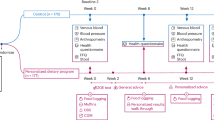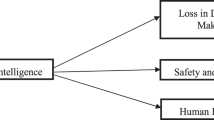Abstract
Background/objectives
The objective of the study was to assess adolescent learners’ nutritional knowledge to suggest early intervention strategies that address knowledge deficiency gaps that have a negative impact on personal health and productivity.
Subjects/methods
A cross-sectional survey design was used in the study. One circuit was purposively selected from Pinetown District, KZN, South Africa. A representative sample of 108 learners was randomly selected from 7 of the 8 schools in the district to complete the investigator administered questionnaire between July and August 2017.
Results
Although the majority of learners were familiar with the nutrition education principles, a large proportion lacked the knowledge of essential nutrition and were in support of the incorporation of various strategies to promote nutrition education. Friedman test revealed significant differences, χ2 (3) = 192.4, p < 0.001, between the mean rank scores of familiarity to different nutrition principles. Relative to other principles, balanced diet and food groups were the most critical issues. The overall mean of 3.7 for learners’ priority level on nutrition education principles indicated the learners’ view that knowledge of all principles was necessary for the attainment of a healthy lifestyle.
Conclusions
Many learners were not familiar with nutrition education principles. Hence this paper becomes very critical as it communicates the information to the community and suggests various nutrition education intervention strategies that have to be put in place in the school system to impart the necessary knowledge and skills that promote a long-term healthy lifestyle for the learners.
This is a preview of subscription content, access via your institution
Access options
Subscribe to this journal
Receive 12 print issues and online access
$259.00 per year
only $21.58 per issue
Buy this article
- Purchase on Springer Link
- Instant access to full article PDF
Prices may be subject to local taxes which are calculated during checkout
Similar content being viewed by others
References
Vidgen HA, Gallegos D. Defining food literacy and its components. Appetite. 2014;76:50–9.
Gregory CA, Coleman-Jensen A. Food insecurity, chronic disease, and health among working-age adults. Washington, DC: Economic Research Service, US Department of Agriculture; 2017.
Truman E, Elliott C. Barriers to food literacy: a conceptual model to explore factors inhibiting proficiency. J Nutr Educ Behav. 2018;51:107–11.
Pengitore D, Fusco C. Eat yourself well with the reverse food guide: a workbook and guide for healthy living. Bell Crescent: Wheatmark; 2018.
Hardman A, Gill J, Stensel D. Physical activity and health: the evidence explained. Singapore: Routledge; 2019.
Savoie-Roskos MR, Coombs C, Neid-Avila J, Chipman J, Nelson S, Rowley L, et al. Create better health: a practical approach to improving cooking skills and food security. J Nutr Educ Behav. 2019;51:116–20.
Fernandes M, Galloway R, Gelli A, Mumuni D, Hamndani S, Kiamba L, et al. Enhancing linkages between healthy diets, local agriculture and sustainable food system: the school meals planner package in Ghana. London: SAGE; 2016.
Dansa R, Reta F, Mulualem D, Henry CJ, Whiting SJ. A nutrition education intervention to increase consumption of pulses showed improved nutritional status of adolescent girls in Halaba Special District, Southern Ethiopia. Ecol Food Nutr. 2019;58:353–65.
Burkhart S, Craven D. Digital workbooks in flipped nutrition education: student perspectives’. Educ Sci. 2020;10:1–10.
Holli BB, Beto JA. Nutrition counselling and education skills for dietetic professionals. 6th edn. Baltimore: Lippincott Williams and Wilkins; 2014.
Van den Berg VL, Albera BMM, Nel M, Walsh CM. Nutritional status of undergraduate healthcare students at the University of the Free State. S Afr Fam Pract. 2013;55:445–51.
Lacey G. Guidebook to education in the commonwealth. London: Commonwealth Secretariat; 2012.
Mnakwe NE. Community nutrition: planning health promotion and disease prevention. 2nd edn. Burlington: Jones and Barlett Learning; 2013.
Mushapi LF, Dannhauser A, Walsh CM, Mbhenyane XG, van Rooyen FC. Effect of nutrition education programme on the nutritional status of children aged 3–5 years in Limpopo Province in South Africa. S Afr J Child Health. 2015;9:98–102.
Temple NJ, Steyn N, (Eds). Community nutrition for developing countries. Athabasca, AB: University AU Press; 2016.
Department of Basic Education. National school nutrition programme. Pretoria: Department of Basic Education; 2014.
Adamu A, Adjei NKG, Kubuga CK. Effects of dietary patterns on the nutrition status of upper primary school children in tamale metropolis. Pak J Nutr. 2012;11:689–707.
Oldewage-Theron WH, Egal A. Impact of nutrition education on nutrition knowledge of public school educators in South Africa: a pilot study. Health SA Gesondheid. 2012;17:602–10.
Langsford C. Enough on our plate? The national school nutrition programme in two schools in Katlehong, South Africa. In: a dissertation submitted in partial fulfilment of the requirements for the degree of Master of Arts (Developmental Studies). Johannesburg: University of the Witwatersrand; 2012.
Saribay KA, Kirbaş S. Determination of nutrition knowledge of adolescents engaged in sports. Univ J Educ Res. 2019;7:40–47.
Ozdogan Y, Yardiminci H, Ozcelik AO. Assessment of nutrition knowledge among university students in Ankara. J Sci Res Rep. 2018;20:1–8.
Mogre V, Stevens FCJ, Aryee PA, Amalba A, Scherpbier AJJA. Why nutrition education is inadequate in the medical curriculum: a qualitative study of students’ perspectives on barriers and strategies. BMC Med Educ. 2018;18:1130–5.
Krupa R, Leema J, Liby K, Linsha K, Maria A, Maria G, et al. Balanced diet: knowledge and practice of adolescents. Indian J Public Health Res Dev. 2020;11:114–8.
Geeta A, Mishra S. Effects of junk food and beverages on adolescents’ health: a review article. J Nursing Health Sci. 2013;1:26–32.
Creswell JW. Research design: qualitative, quantitative, and mixed methods approach. 4th ed. London: SAGE Publications Ltd; 2014.
Ling L, Ling P, (Eds.). Methods and paradigms in education research. Hershey: IGI Global; 2017.
Teddlie C, Tashakkori A. Foundations of mixed method research: integrating quantitative and qualitative approaches in the social and behavioural sciences. London: Sage Publication, Inc.; 2009.
Ryan TP. Sample size determination and power. NJ: John Wiley & Sons; 2013.
Medeiros IMS, Lima SG, de Almeida Maffi B, de Lima Abadia L, Martins FA, Dalamaria T, et al. Inadequacies in good manufacturing practices and high health risks are still problems in food production in public preschools and day-cares in Rio Branco, Acre, Western Brazilian Amazonia. Adv Food Technol Nutr Sci Open J. 2015;1:S38–46.
Maijers W, Nalla VR.Analysis of supply chain studies for home grown school feeding. Procurement governance for home grown school feeding project learning series #2. Alkmaar: Netherland Development Organisation; 2014.
Okae-Adjei S, Akuffo B, Amartei C. Ghana’s school feeding programme in perspective: a case study of the Akuapem North Municipality in the Eastern Region. Int J Technol Manag Res. 2016;1:31–41.
Rendall-Mkosi K, Wenhold F, Sibanda NB. Case study of the national school nutrition programme in South Africa London: Partnership for Child Development, University of Pretoria; 2013.
Cacioppo JT, Freberg LA. Discovering psychology: the science of mind. San Luis Obispo: Cengage Learning; 2019.
Wadhera D, Capaldi-Phillips ED. A review of visual cues associated with food acceptance and consumption. Eat Behav. 2014;15:132–43.
Hochfeld T, Graham L, Stuart L, Gent MY. Evaluation study of the national school nutrition programme and the tiger brands foundation in-school breakfast feeding programme in the Lady Frère and Qumbu Districts of the Eastern Cape. Johannesburg: Centre for Social Development in Africa, University of Johannesburg; 2015.
Craigie AM, Lake AA, Kelly SA, Adamson AJ, Mathers JC. Tracking of obesity-related behaviours from childhood to adulthood: a systematic review. Maturitas. 2011;70:266–84.
Tamiru D, Argaw A, Gerbaba M, Nigussie A, Ayana G, Belachew T. Improving dietary diversity of school adolescents through school-based nutrition education and home gardening in Jimma Zone: quasi-experimental design. Eat Behav. 2016;23:180–6.
Cenić D, Petrović J, Cenić S. The most important motivation factors for knowledge acquisition and successful learning. Facta Univ. 2018;2:149–59.
Friend S, Flattum CF, Simpson D, Nederhoff DM, Neumark-sztainer D. The researchers have left the building: what contributes to sustaining school-based interventions following the conclusion of formal research support? J Sch Health. 2014;84:326–33.
Nayak BS, Bhat VH. School-based multicomponent intervention for obese children in Udupi district, South India—a randomised controlled trial. J Clin Diagn Res. 2016;10:SC24–8.
Bergström H, Haggård U, Norman Å, Sundblom E, Elinder LS, Nyberg G. Factors influencing the implementation of a school-based parental support programme to promote health-related behaviours-interviews with teachers and parents. BMC Public Health. 2015;15:541.
Kupolati MD, Gericke GJ, Maclntyre UE. Teachers’ perceptions of nutrition education influence on eating behaviours of learners in the Bronkhorstspruit District South Africa. S Afr J Educ. 2015;35:1–10.
Ickes S, Mahoney E, Roberts A, Dolan C. Parental involvement in a school-based child physical activity and nutrition program in Southeastern United States—a qualitative analysis of parenting capacities. Health Promot Pract. 2016;17:285–96.
Nyberg G, Norman A, Sundblom E, Zeebari Z, Elinder LS. Effectiveness of a universal parental support programme to promote healthy behaviours and prevent overweight and obesity in 6-year-old children in disadvantaged areas, the Healthy School Start Study II, a cluster-randomised controlled trial. Int J Behav Nutr Phys Act. 2016;13:4.
Patino-Fernandez AM, Hernandez J, Villa M, Delamater A. School-based health promotion intervention: parent and school staff perspectives. J Sch Health. 2013;83:763–70.
Wang D, Steward D, Chang C, Shi Y. Effect of a school-based nutrition education programme on adolescents’ nutrition-related knowledge, attitudes and behaviour in rural areas of China. Environ Health Prev Med. 2015;20:271–8.
Acknowledgements
The author is very grateful to Professor C. Maphosa, Dr. O. Ige and the editors Mr. F. Geel, Dr. B. Dube and Dr. S. Loot who improved several sections of the article.
Author information
Authors and Affiliations
Corresponding author
Ethics declarations
Conflict of interest
The author declares no conflict of interest.
Additional information
Publisher’s note Springer Nature remains neutral with regard to jurisdictional claims in published maps and institutional affiliations.
Rights and permissions
About this article
Cite this article
Mafugu, T. Assessment of high school learners’ familiarity with nutrition education principles. Eur J Clin Nutr 75, 392–399 (2021). https://doi.org/10.1038/s41430-020-00712-5
Received:
Revised:
Accepted:
Published:
Issue Date:
DOI: https://doi.org/10.1038/s41430-020-00712-5



